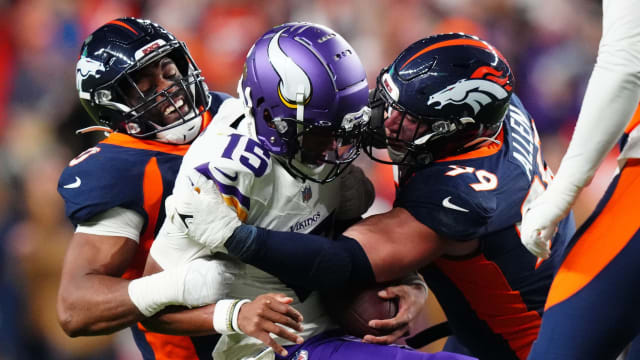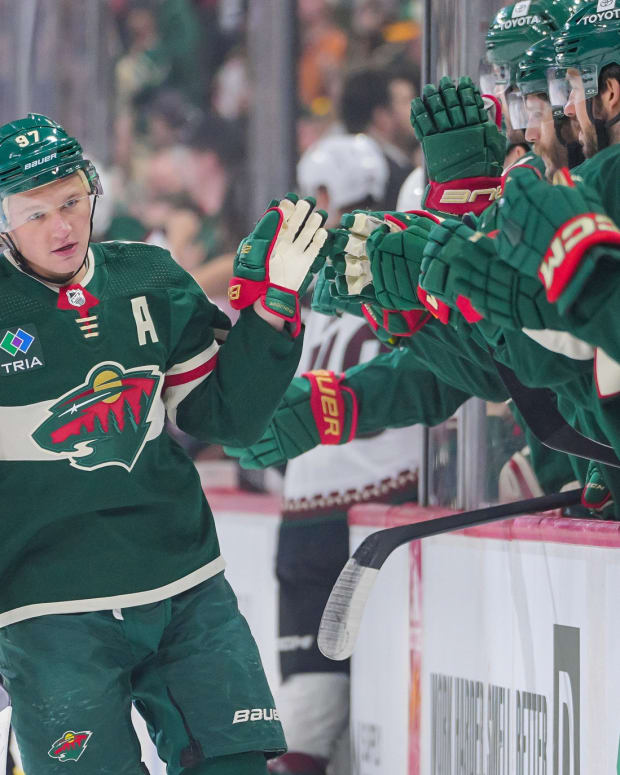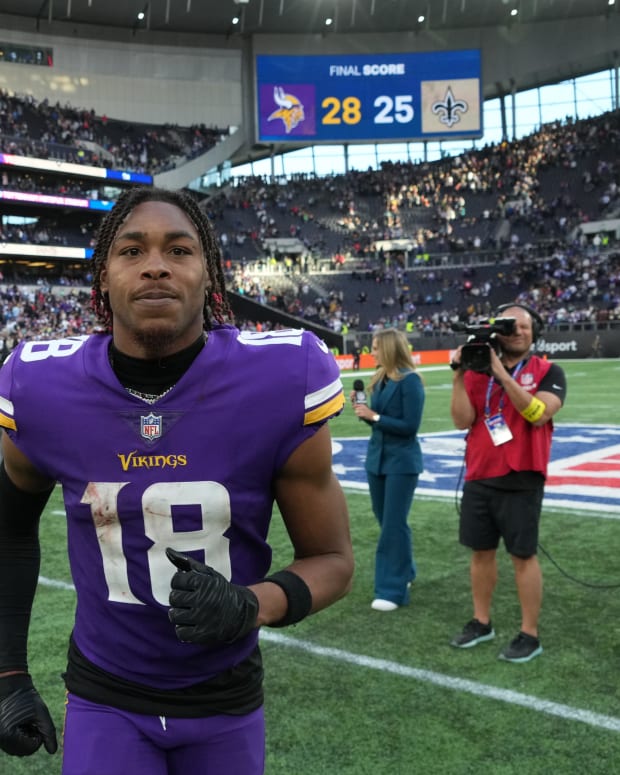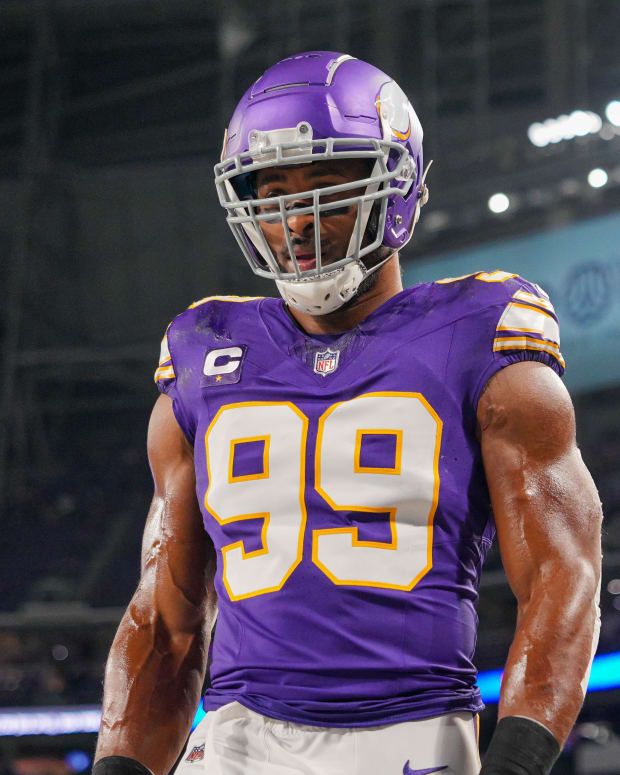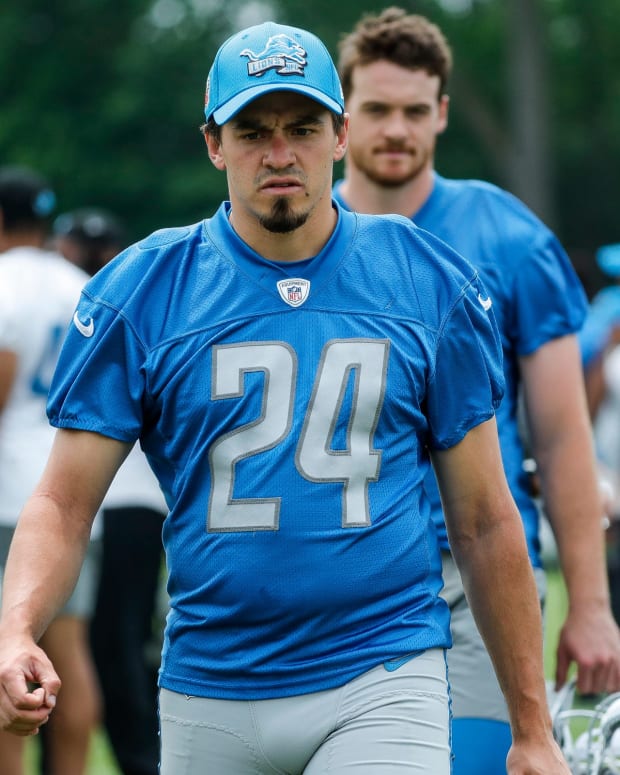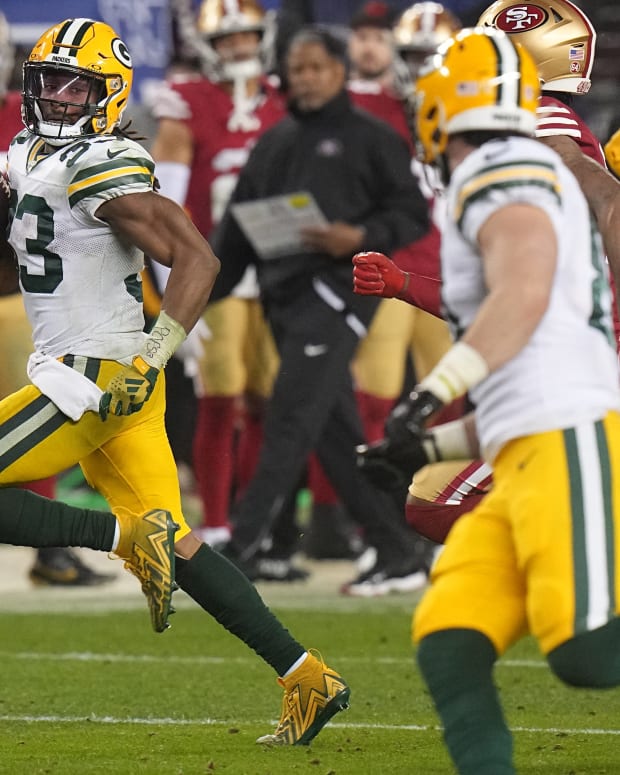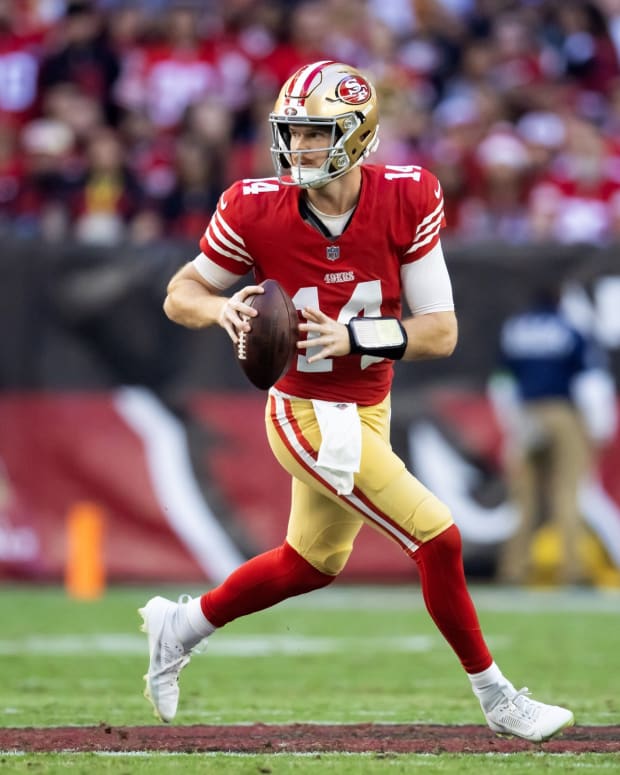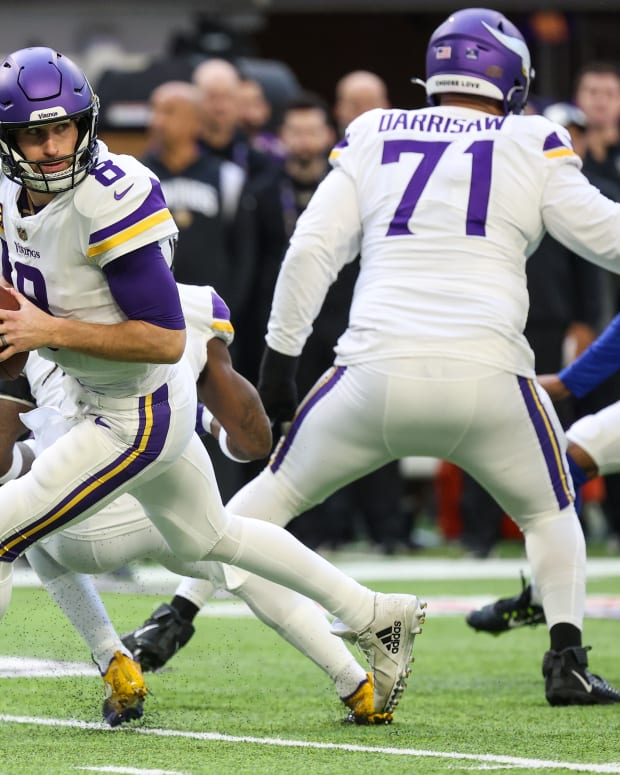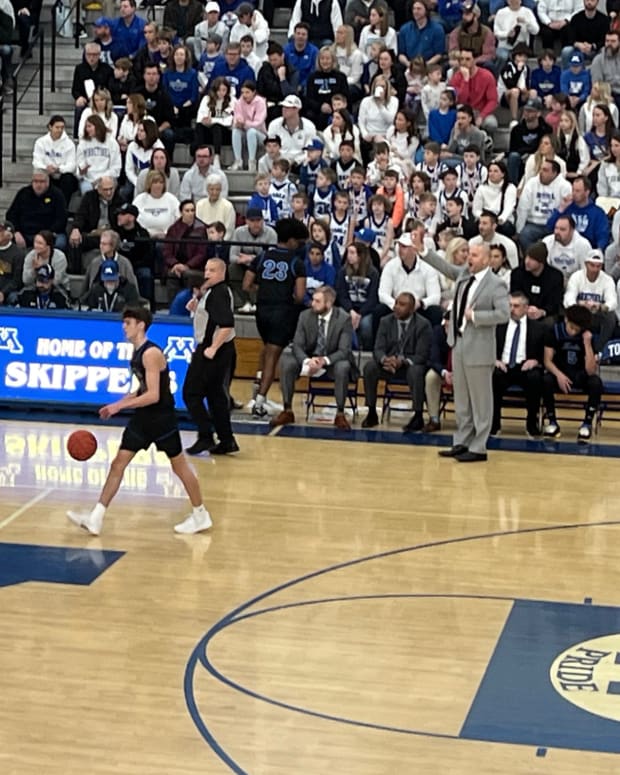Matthew Coller: In Vikings loss to Broncos, turnovers take the blame
DENVER — Football people say things all the time to deal with the fact that turnovers can be random and often times have a massive impact on outcomes. It’s a game of inches. Funny shaped ball. Didn’t get the bounces etc. And while all of the clichés apply to the Minnesota Vikings’ 21-20 loss to the Denver Broncos in which they lost the turnover battle by three and the game by just one point, it doesn’t feel satisfactory in such a gut-punch loss to say that turnovers were the sole reason things came apart on Sunday Night Football.
Not that the argument isn’t compelling.
When they reached the inflection point of the game — Alexander Mattison’s late third quarter fumble that opened the door to a Broncos comeback from down 17-9 — the Vikings had outplayed their opponents by a fairly significant margin. They weren’t just ahead, they were ready to go ahead by more and force Denver’s mediocre passing game to chase them down from behind.
Josh Dobbs had just completed a 29-yard pass and converted a third-and-2 to set the Vikings up at the Broncos 34-yard line, well within range of a Greg Joseph field goal in the Mile High City. The way they had been running the ball it seemed likely that the Vikings could get Joseph into chip-shot range or tack on a dagger touchdown.
To that point Dobbs was a bit uneven throughout the night, yet still had an excellent stat line and two tremendous touchdown plays that his Tik Tok editor was no doubt pairing together with music and clips from TV shows to post as soon as the win was secured. The running game was humming and Brian Flores’ defense forced back-to-back punts to start the second half and had given the Broncos hell every time they dared to enter the red zone.
There was nothing to suggest that the Broncos could have sniffed a comeback without it being served to them like a fastball down the middle to Larry Walker at Coors Field. Russell Wilson looked like he didn’t have the same touch or explosiveness as years past. The Broncos weren’t running the ball well. Their defense was getting worn down. All signs said that if the Vikings had been able to even kick a field goal that they would have cruised to 7-4. In fact, ESPN’s Gamecast gave them an 87.5% chance to win if calamity had not struck.

Nov 19, 2023; Denver, Colorado, USA; Minnesota Vikings quarterback Joshua Dobb (15) fumbles against the Denver Broncos in the first quarter at Empower Field at Mile High.
Credit: Ron Chenoy-USA TODAY Sports
But the turnover hammer nailed them right in the head. Mattison had the ball knocked loose, which gave the Broncos new life. They went on a field goal drive to cut the score to 17-12 and their winning chances dropped by 20%.
Still the funny shaped ball was in their court. That is, until running back Ty Chandler couldn’t hold onto a blitzing linebacker quite long enough and Dobbs’ arm was hit from behind. The ball fluttered right into the Broncos’ waiting hands and they put three more points on the board.
Even after all that, the Vikings put together a wild drive that included a 31-yard gain on a fake punt and a 20-yard reception on third-and-20 — both by Chandler — and kicked a field goal to take a 20-15 lead. On the following possession, they had Wilson staring at fourth-and-3 with the game on the line and near 90% odds to win.
The Broncos converted and then dinked and dunked their way down the field back into scoring position. There was a fumble that bounced out of bounds that nobody will ever remember and then Wilson found Courtland Sutton in the back of the end zone for a spectacular touchdown to win the game for Denver.
“I think between special teams kicking in a play or two, offensively moving it the way we did and defensively kind of responding to some of those turnovers, it feels like there was a lot of things we did to try to win the football game but the number one thing we talked about to make sure we tried to come in here and do, we did not do. We lost that turnover battle,” O’Connell said.
It is difficult to debunk the idea that the cause of the loss was two turnovers at the worst possible times. Had Mattison’s fumble popped into a Viking player’s hands or Dobbs’ pass hit the ground, we would be heaping praise on another well played victory. The headlines would have been: Six in a row! Playoffs here we come! Dobbs forever!
The Vikings had 385 yards of total offense. Only three teams average more than that per game in the NFL this year. They averaged 5.5 yards per play even with the ugly attempt at a final drive, which would rank in the top 10.
In the postgame locker room, players struggled to grasp what happened.
“I thought we did some good things on offense,” Dobbs said. “We challenged the offensive line early with wanting to establish a presence up front and on the line of scrimmage. They did a great job, especially in the first half, of allowing us to lean on them and get into a rhythm. I thought Alex (Vikings RB Alexander Mattison) and [RB] Ty [Chandler] did a great job of running the ball downhill. We had a lot of explosive runs. Guys made some big catches down the field as well. We were leading up until the last two-minute drive….It came down to turnovers.”
Defensive players were hard on themselves about the last drive but it’s hard to ask much more from them than allowing just one touchdown on five trips into the red zone and giving up 295 total yards.
“Their best players made plays when they needed it and that’s all I can say,” safety Josh Metellus said.
“We played well the whole game,” Cam Bynum said. “Not well enough.”
While we can strongly say that the turnovers bit them hard and directly caused the Vikings to lose in Denver, there were still plenty of opportunities missed along the way.
That starts with the beginning of the game. On third-and-1, O’Connell called a gimmick play in which tight end TJ Hockenson flipped the ball to Dobbs. He was hit hard by safety Kareem Jackson, who O’Connell believed should have been flagged for lowering the crown of his helmet and launching himself into the quarterback. The ball popped up and the Broncos recovered.
O’Connell defended the play call, saying “if the play works, we’re probably excited about it.”
Certainly that’s true but there are multiple layers of risk that they took by calling for trickeration — from snapping it to a tight end to putting the quarterback in position for linebackers and safeties to come flying downhill at him. On third-and-1 against the 32nd ranked defensive team in rushing, it hardly seems unreasonable to wonder if they were too clever.
“Execution was not what we would have liked on the play and no matter what, we can’t turn the football over,” O’Connell said. “I do know he took a pretty good shot to the helmet on the play, and he was evaluated after that, but the way we ran it most of the night, I liked the call in the moment, especially early on in the game but it didn’t work out.”
In the latter part of the first half the Vikings also allowed Denver to hang around. With 1:23 left in the half and facing third-and-1 again, they elected to throw the ball with Dobbs and he flung the ball inaccurately to Mattison. Not only did they fail to get the first down but stopped the clock for the Broncos. Rather than look to run for the first down and try to score before the half, they punted the ball away and it skipped into the end zone.
Denver ended up using every extra second to produce a field goal and keep the score at 10-9 in the half despite the Vikings moving the ball much better overall.
After the defense held Denver to a field goal following Dobbs’ interception, the Vikings had first-and-10 at the Denver 12-yard line with a chance to make everyone forget about the miscues. Instead they ran twice for no gain and put their journeyman QB in third-and-long. He threw incomplete and the Vikings settled for three.
On the defensive side, they allowed Wilson to complete five passes in a row on the final drive that didn’t travel 10 yards in the air yet covered 53 yards and put them in position for the game-winning score.
“He played his best at the end of the game and we’ve got to match that as well as a defense to not let them march down at the two-minute drill,” safety Cam Bynum said. “[They] really drove down by throwing short passes, and we’ve got to run up and tackle it. So good plan for them and it ended up working.”
And then on the Vikings final offensive possession there was plenty of time to work methodically. They had 1:03 left with timeouts in hand. They converted a first down and then stood only about 20-25 yards from getting into Greg Joseph’s range. Denver pressured, the Vikings failed and went home with their winning streak over.
“I thought they did a good job of matching some of our concepts,” Dobbs said. “We were able to get it started. That is the key in a two-minute drive, you want to get the drive started. I could have given [TE] TJ [Hockenson] a couple better balls on his out cuts allowing him at worst to get five yards and at best to make a guy miss and get down the sideline. That is an area of improvement, just being more accurate in those situations.”
Both things can be true that turnovers were the direct cause of the Vikings’ loss in Denver and there were plenty of other moments where they had a chance to win the game and didn’t make one more play. They went just 6-for-15 on third down and did not press the gas pedal down in the right spots.
The next level to the Who’s Fault Is It Anyway? conversation that goes on after every loss around the NFL is the bigger picture implications. The Vikings still have a strong grip on the final playoff spot in the NFC and they are set to face a struggling Bears team and then Vegas and Cincinnati clubs who are running out their backup quarterbacks. It’s fair to say that if they outgain those opponents by 100 yards and do not lose the turnover battle badly that the Denver game should end up as a blip on the radar.
But where the team should be most frustrated about their wasted trip to the Rocky Mountains is that the win was in their hands and — no matter who you blame — they let it slip. A victory would have essentially removed all doubt that they would be playing in the postseason and now there are still teams behind them whose chances stay alive.
And if they leave it up to the shape of the ball down the stretch, you never know where things could bounce.

